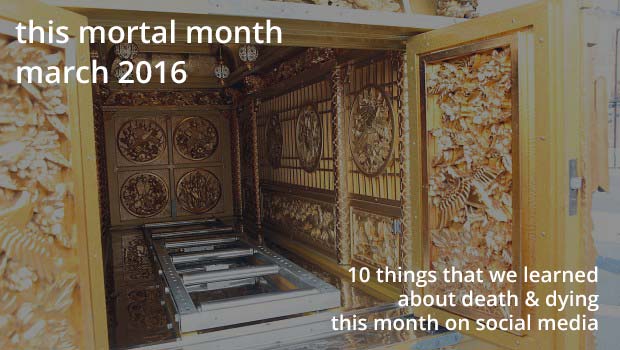This mortal month: March 2016
10 things that we learned about death and dying this month on social media
Taking a look at changing attitudes to death and funeral traditions
Alternative hearses showcased at new Liverpool funeral home
The newest branch of Co-operative Funeralcare in Liverpool in the UK has a new range of alternative hearses on display, as a growing number of people wish to make their final journey in a vehicle that reflects their favourite hobby or pastime. While horse-drawn carriages and bicycles are the most popular, the company also has had requests for lorries and mil floats, and also has a Buddhist hearse in its fleet.
Bristol Museum is holding a Death Fair
As part of its exhibition on Death: The Human Experience which runs until the 13th of March, Bristol Museum will host a Death Fair on the 5th of March. It’s a day of talks, walks, demos and stalls offering a practical guide to dealing with death, dying and bereavement.
A grief support network has Spotified songs about the death of a friend
What’s Your Grief, a grief support organisation run by mental health professionals and based in Baltimore, Maryland, has compiled a Spotify playlist of 64 songs about the death of a friend. The list began when they received a letter from a woman whose best friend of over 25 years had died, and the article they wrote about losing your best friend, and the healing power of music, is an inspiring and helpful read.
LSD could be used to help people confront death
Vice reports that Erika Dyck, a medical historian and a professor at the University of Saskatchewan in Canada, cites a renewed medical interest in the use of LSD, specifically in the fields of palliative care and geriatric care. A 2014 trial held in Switzerland highlighted the safety and efficacy of LSD-assisted psychotherapy in patients with anxiety associated with life-threatening diseases, and recommends further studies.
Promession: eco-friendly burial which continues the circle of life
Swedish biologist Susanne Wiigh-Mäsak has spent 20 years developing Promession, a process that could possibly be the most eco-friendly form of burial developed to date. The company, called Promessa, cryogenically freezes the body, then vibrates it until it turns into dust, and the remains are freeze dried to remove any liquids, and also have any metals removed. The remains are then placed in a completely biodegradable container made from potato or corn starch, which is then buried 30-50 centimeters below ground where it is still in contact with the top soil and new soil will be generated within six to 18 months.
The Vietnamese town where the dead live more comfortably than the living
People living in the village of An Bang, Vietnam, are spending up to €65,000 on elaborate graves to pay respects to their ancestors and also in the belief that it will bring good fortune to their families, with some building ornate headstones for themselves before they have even died.
Graves raided in Chinese village as women’s corpses stolen for use in “ghost weddings”
Residents of Dongbao, a village in the northern province of Shanxi in China, are in despair as the bodies of their mothers, grandmothers and other female relatives are being stolen from their graves. A rural superstition dating back to the 17th century BC considers it bad luck for a single man to be buried alone, and this superstition has fueled the demand for female bodies to be buried with these men in a ritual known as a “ghost wedding”. Despite security measures being taken, some thieves have dug three metres into the ground in order to steal a body to sell on the black market.
How to start an end-of-life book club in your community
Author and family physician Karen Wyatt has spent many years as a hospice medical director and specialized in caring for dying patients in their homes. She writes about the benefits of starting an end-of-life book club, and how, by reading books about death you will have the opportunity to learn from those who have gone before you and faced the greatest crisis of life.
Garments from the graves of late antiquity
An exhibition of rare tapestries and textiles preserved through their use in cemeteries is taking place at the Institute for the Study of the Ancient World in Manhattan. These items are rarely on public view, as it’s only through their use as shrouds in cemeteries that the textiles resisted decay. Designing Identity: The Power of Textiles in Late Antiquity runs until 22 May at New York University’s Institute for the Study of the Ancient World.
A brief history of the funeral procession
Tony Moore, director of funeral service education at Northhampton Community College in Bethlehem, Pennsylvania gives a short history of the funeral procession, or cortege, which dates back to the Ancient Egyptians. While in the past people would pull over and pay respect to the funeral procession, nowadays it appears that this reverence is being lost as people often ignore the cortege or refuse to wait for it to pass by.


Leave a Comment
You must be logged in to post a comment.